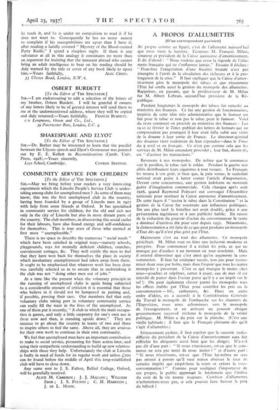COMMUNITY SERVICE FOR CHILDREN
[To the Editor of THE SPECTATOR.]
Sm,—May we bring before your readers a very interesting experiment which the Lincoln People's Service Club is under- taking among clubs for unemployed men ? As some of them may know, this was the first unemployed club in the country, having been founded by a group of Lincoln men in 1927 with help from some friends at Oxford. It has specialised in community service for children, for the old and sick not only in the city of Lincoln but also in more distant parts of the country: The club members, in discovering this social outlet for their labours, have also found energy and self-confidence for themselves. This is true even of those who seemed at first most " unemployable."
There is no space to describe the numerous " social needs " which have been satisfied in original ways—nursery schools, playgrounds, toys for mentally deficient children, crutches, convalescent cottages, &c. They well entitle the men to feel that they have won back for themselves the place in society which involuntary unemployment had taken away from them. It ought to be emphasised that whatever work has been done was carefully selected so as to ensure that in undertaking it the club was not " doing other men out of jobs."
At a time like the present when the voluntary principle in the running of unemployed clubs is again being subjected to a considerable amount of criticism it is essential that those who believe in it should not be hampered in putting and, if possible, proving their case. Our members feel that only voluntary clubs taking part in voluntary community service can really fill the want in the lives of the unemployed. As one of them put it recently, " A club in which the main occupa- tion is games, and Only a little carpentry for one's own use is dose now and then, is standing upside down." They are anxious to go about the country in teams of two and three to inspire others to feel the same. Above all, they are anxious for their own work to continue in their own community.
We feel that unemployed men have an important contribution to make to social service, pioneering for State action later, and using their sympathetic understanding to build up new relation- ships with those they help. Unfortunately the club at Lincoln is badly in need of funds for its regular work and unless £200 can be found before the middle of April this long-established club will have to close down.
Any sums sent to J. S. Fulton, Balliol College, Oxford, will be gratefully received.
ALICE M. CAMERON ; J. J. MALLON ; WILLIAM .EBOR .; J. S. FULTON ; C. H. HARRISON ; J. DE L. MANN.










































 Previous page
Previous page